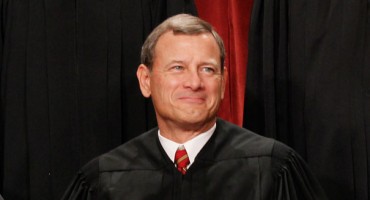
Just like a crumbling Julius Caesar, America’s conservatives, grasping for any refuge after three years of legislative onslaught recently coupled with a brutal primary season, seemed to look upon John Roberts with dumfounded horror as he delivered a staggering body blow in his 5-4 majority opinion.
Regardless though of whether one sees the Chief Justice as Judas Iscariot or an unlikely savior, almost all can agree that this time yesterday, few fathomed that John Roberts would become the champion of Obamacare’s constitutionality while Anthony Kennedy would sign onto its rather-scathing dissent.
As a twenty-year-old college junior who hasn’t even opened an LSAT book, it’d probably be unwise to publicly hazard some constitutional insight or judgment on the Chief Justice. It’s also a job that has already been voraciously taken up by many an expert as well as an entire army of cable news punditry. Rumor has it that CNN is even setting up a hologram debate between John Roberts and James Madison (not actually, but depressingly believable).
Outside of the legal thorns and broader pronouncements of proper jurisprudence, though, there is a swath of troubling outgrowths to this decision to even the collegiate layman. Two, in particular, come to mind.
First, simply put: What’s next?
As Chief Justice Roberts’ opinion lays out, the individual mandate avoids any constitutional qualms of coercion by instead becoming the opposite of its very nature: a basic, voluntary choice to each citizen. Everyone has the freedom to choose, just only between enrolling in an insurance program or paying a tax.
In the specific circumstance of Obamacare, this principle, albeit concerning, does not seem overwhelmingly burdensome; in fact, the “tax” is well-below the cost of enrolling in the healthcare program.
However, what rationale is available anymore to prevent that penalty from going to higher number? A penalty set at, say, fifteen percent of one’s income would not be a choice at all for most families. It’s as if a bartender insisted there was no drink minimum because you had the free choice, should you just want refills of cranberry juice, to go ten rounds with the bouncer outside.
And why stop at fifteen? Can’t we remove all non-compliance by hiking the number to seventy, eighty, ninety percent of someone’s income? Without the constitutional creation of some arbitrary watermark number (an issue in itself), this penalty-or-comply justification has all the teeth of the most tame formality.
Cautiously peering off into the horizon, it seems that this principle has a very logical next application – the environment. It is not difficult to imagine a bill some years from now that provides Americans with a “choice”: a Chevy Volt (or something similar) or a $5000 penalty to keep your car of choice. The same holds for solar panels for homes or whatever other project is the next necessary step in “moving forward.”
The takeaway here is not some grand conspiracy theory (I really don’t expect such legislation to happen), but the fact that this is now an entirely political question. The Constitution, on face, no longer applies to matters of this ilk. The political landscape has been fundamentally redefined because the questions surrounding such federal behavior no longer start with can, but now should.
Second, it is very possible that the 24/7 news cycle will forever, and continually, taint the integrity of the highest court in the land. Judging by coverage of the term’s set of decisions, it is quite reasonable for a casual observer to see a law clerk as just an overly-educated consultant who has to doll up an opinion with some precedent here and some lofty legal language there in order to disguise the Justices’ true, unyielding political ambitions.
Leading up to the decision, the Roberts court was accused of being in the pockets of a litany of grand puppeteers: the Republican Party, Wall Street, the Chamber of Commerce, the Koch Brothers, just to name some of the usual suspects. The four conservatives on the Court were undoubtedly no-votes (of course, Breyer, Sotomayor, Kagan, and Ginsburg were wise, impartial jurists) because they were ultimately in this for some larger interest.
And what happened to this narrative when Roberts did the exact opposite? Nothing at all; with an easy pivot, it quickly became a Machiavellian twist to save his legacy. Among all the loud speculative disagreements on the Chief Justice’s true motives for his vote, we can be sure of one thing: it wasn’t because he actually just believed it was Constitutional.
I’m far from a fan of today’s opinion – observers (and Justices) far more versed than I have spent the day artfully picking apart Roberts’ work – but the other, sensationalized rhetoric coming from a disheartening majority of media outlets has genuine, longstanding repercussions beyond the practical merits of the decision. The un-tempered simplicity ascribed to matters of constitutional law or this horrifying ease employed to re-brand the actual decisions of the Supreme Court has very real consequences. It’s easy to beat up on the media now, but that doesn’t negate the impacts of their consistently damaging circus.
In this Presidential term, from Citizens United to today’s ruling, a very pernicious, yet intractable, cloud has formed over the Supreme Court. It has been gradually torn down, from the President’s bully-pulpit at the State of the Union to the steps of the courthouse itself, from whatever historical place of elevation it had due a sense of institutional dignity. When looking at the longstanding legacy of this decision, one would be remiss to ignore the grave stigma that has developed on the court’s gravitas, let alone its jurisprudence.
There are a number of lenses through which to look at the Supreme Court’s decision today. Constitutionally, it’s probably very bad law. Economically, it possesses frightening practical consequences. But from the lens of those voting in a presidential election for the first, or second, time, it is wide, far-reaching, and, regardless of what a court may do in the future, permanent.
Click here to Like The College Fix on Facebook.





Please join the conversation about our stories on Facebook, Twitter, Instagram, Reddit, MeWe, Rumble, Gab, Minds and Gettr.